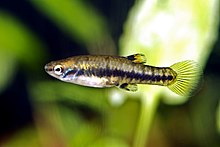Heterandria
| Heterandria | |
|---|---|

| |
| Least killifish (H. formosa), adult female | |
| Scientific classification | |
| Domain: | Eukaryota |
| Kingdom: | Animalia |
| Phylum: | Chordata |
| Class: | Actinopterygii |
| Order: | Cyprinodontiformes |
| Family: | Poeciliidae |
| Tribe: | Heterandriini |
| Genus: | Heterandria Agassiz, 1853 |
| Type species | |
| Heterandria formosa | |
Heterandria is a genus of livebearing fishes within the family Poeciliidae. Most species occur in Guatemala and its surroundings, particularly Mexico, but the midget livebearer (H. formosa) comes from the southeastern United States.
Though many Poecilidae are familiar aquarium fishes, e.g. guppies, mollies, platys and swordtails, species within Heterandria are not commonly kept as pets. Somewhat more frequently found in aquaria is H. formosa, perhaps because it is one of the smallest known fish species in the world; its diminutive males are probably the smallest fish easy to keep as a pet. Species in this genus resemble egg-laying Cyprinodontoidei such as Fundulidae (topminnows) at first glance, and are thus sometimes called "killifish" though this is technically erroneous.[2]
Species
[edit]FishBase currently recognize 3 species in this genus,[3][4] but based on genetics, external characters, morphometrics and meristics H. formosa (the type species of the genus) is not closely related to the remaining, which have been moved to their own genus, Pseudoxiphophorus.[5][6][7] There are probably more remaining undiscovered[citation needed] as these fishes are rather inconspicuous. However, it is not very likely that many species remain unknown to science as this genus is only found in a rather restricted region, and only one new species has been discovered since 1980.
The three species classified under this genus are:[3]
- Heterandria attenuata D. E. Rosen & R. M. Bailey, 1979
- Heterandria formosa Girard, 1859 (Dwarf livebearer, least killifish)
- Heterandria tuxtlaensis McEachran & T. J. DeWitt, 2008
References
[edit]- ^ Eschmeyer, William N.; Fricke, Ron & van der Laan, Richard (eds.). "Heterandia". Catalog of Fishes. California Academy of Sciences. Retrieved 3 November 2019.
- ^ FishBase (2009): Heterandria species. Retrieved April 8, 2009.
- ^ a b Froese, Rainer; Pauly, Daniel (eds.). "Species in genus Heterandria". FishBase. August 2019 version.
- ^ John D. Mceachran & Thomas J. Dewitt (2008). "A new livebearing fish, Heterandria tuxtlaensis, from Lake Catemaco, Veracruz, Mexico (Cyprinodontiformes: Poeciliidae)" (PDF). Zootaxa. 1824: 45–54. doi:10.11646/zootaxa.1824.1.5.
- ^ Froese, Rainer; Pauly, Daniel (eds.). "Species in genus Pseudoxiphophorus". FishBase. August 2019 version.
- ^ Morales-Cazan, A.; and Albert, J.S. (2012). Monophyly of Heterandriini (Teleostei: Poeciliidae) revisited: a critical review of the data. Neotrop. Ichthyol. 10 (1).
- ^ Agorreta, A.; Domínguez-Domínguez, O.; Reina, R.G.; Miranda, R.; Bermingham, E.; and Doadrio, I. (2013). Phylogenetic relationships and biogeography of Pseudoxiphophorus (Teleostei: Poeciliidae) based on mitochondrial and nuclear genes. Mol Phylogenet Evol. 2013 Jan;66(1):80-90
